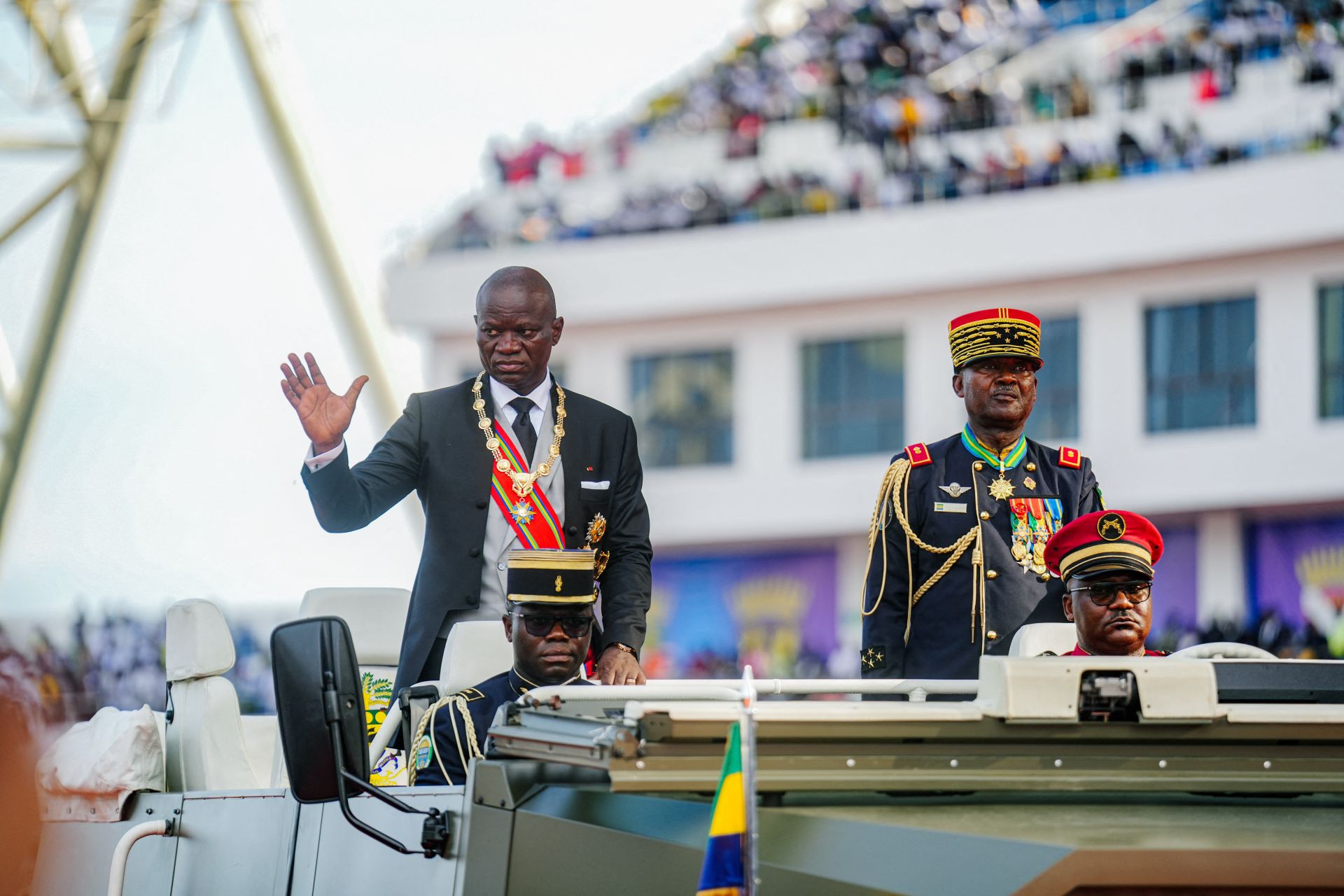- Home
- Middle East
- Two Years After Bongo Removal, Gabon Tackling Myriad Challenges

President of Gabon Brice Oligui Nguema (L) waves to the crowd from a vehicle as he parades around the arena during his swearing-in ceremony at a stadium in Libreville on May 3, 2025 © Nao Mukadi / AFP
Gabon looks like a country under construction two years after a coup that abruptly ended 55 years of rule by the Bongo family.
But for all its new roads, markets and reforms, social and economic problems still loom large.
President Brice Oligui Nguema will use National Liberation Day on the anniversary of the August 30, 2023 coup to visit the big building projects he has initiated.
On toppling Ali Bongo, Oligui pledged to "straighten out" Gabon, ensuring a better life for the citizens of the central African nation whose natural riches traditionally have benefited only a few.
It will also be an opportunity for Oligui, who swept a presidential election in April with nearly 95 percent of the vote, to vaunt his record just weeks before local and parliamentary elections.
"Our political project is one of a clear break with decades of stagnation and predation," he told a national daily last week in an interview to mark his first 100 days as president.
"Economic sovereignty"
Buoyed by securing a seven-year term on the back of a new constitution passed by popular vote last December, Oligui insists he can lift the country out of its "economic torpor."
While Gabon is rich in oil, wood, manganese and other resources, a third of its population lives below the poverty threshold.
Oligui says he is "targeting a growth rate of 10 percent", but World Bank forecasts see only 2.4 percent between now and 2027.
Defending Gabon's "economic sovereignty", he announced in May the end of unrefined manganese exports by 2029 to create jobs by encouraging domestic processing, as well as the creation of purchasing centers to lower the cost of basic necessities.
Those measures will require new infrastructure in a country where water and electricity remain difficult to access, sometimes even in downtown Libreville, the capital.
Jobless challenge
Youth employment was a touchstone issue in Oligui's presidential campaign with a third of people under-25 jobless, according to official figures.
"For me, nothing has changed! Whereas, after the presidential election, we were promised jobs," complains Zita Beboema, 37, a mother of three.
She survives on government aid supplemented by occasional work in the timber industry.
In its June economic outlook, the World Bank highlighted a "mismatch between the skills available and the skills required of the workforce", as well as training.
Despite the announcement of the creation of 163,000 jobs and measures to facilitate entrepreneurship, Oligui has alluded to a "lack of enthusiasm" among many unemployed compatriots.
But he says that he now "invites the youth to seize opportunities" which may materialize.
Not all are convinced.
Axel Jordy Mboumba, 23, a financial controller, regrets there remains "so much unemployment" around him.
For Mboumba, "the same people who did not help the country (before the coup) are still present". He said he will not be voting in the coming polls.
Political outlook
The political landscape has undergone only minor changes with the creation of the presidential party, the Democratic Union of Builders (UDB), coming three months after the election.
Largely composed of Bongo-era leaders, the party is favorite to win legislative and local elections, the first round of which is scheduled for September 27.
It will face a challenge from the Gabonese Democratic Party (PDG) created by late former president Omar Bongo Ondimba.
The movement rallied to the majority at least for the presidential election.
But the former dominant party has been plagued by internal division since Ali Bongo Ondimba, son of Omar Bongo who was president from his father's death in 2009 until 2023, claimed in a video broadcast over social networks in July that he was still at the helm of the party.
Ali Bongo, who spent 20 months as a recluse in his villa in Libreville, finally left the country in May for Angola and then Britain.
Gabon's political opposition is limited to a handful of independent figures and Alain-Claude Bilie-By-Nze -- prime minister for a few months in 2023 -- at the head of the Together for Gabon movement.
With AFP
Comments